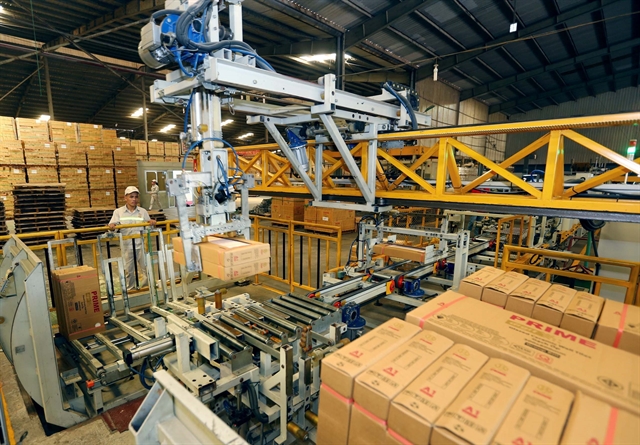 Economy
Economy


|
| A ceramic tile production line of Prime-Đại Việt Joint Stock Company. Many Vietnamese enterprises are increasingly aware of the role of science and technology in sustainable development. VNA/VNS Danh Lam |
HÀ NỘI — With increasing international integration, science and technology plays a key role in the country’s economic development, Chairman of the National Assembly (NA) Committee on Science, Technology and Environment Phan Xuân Dũng has said.
Dũng made the statement while chairing a conference held in Hà Nội on Friday by the committee.
Enterprises are increasingly aware of the role of science and technology in sustainable development. Thus, large enterprises and corporations including Viettel, Vingroup and Trường Hải Auto Corporation have hiked investment in such development.
According to the Party and the State, science and tech provide leverage for restructuring the economy, shifting the growth model and increasing the productivity, efficiency and competitive edge of the economy toward making Việt Nam a modern industrial country.
Participants at the conference said the Law on Science and Technology had created breakthroughs, namely renovation of policies on the use and remuneration of human resources and the application of research results and dissemination of scientific and technological knowledge. The investment in this field and usage and management of the State budget and finance for research were also renewed, they said.
Difficulties
While acknowledging the sector had achieved remarkable results, contributing to national development, participants said it faced a number of challenges.
Hà Quý Quỳnh, head of the Technology Application and Implementation Department, Việt Nam Academy of Science and Technology, said the shortage of human resources was the biggest issue.
The number of scientific and technological researchers has not reached the rate of 10-12 per 10,000 people.
Human resources in ethnic minority, remote areas, islands and those facing economic difficulties were very low, she said.
Quỳnh blamed this on the lack of coordination in planning and training of professional experts in many fields.
Lack of synchronisation in policies and a legal corridor for science and technology, as well as low competence in the work, were also a problem.
“There is no flexible mechanism to create strong links between scientists, research institutes and enterprises,” she said.
To promote the development of the sector in the future, Quỳnh said, human resources was a pre-requisite.
“If there is no staff who meet the requirements, it is difficult to achieve success even with modern equipment.”
“Priority should be given to human resources to have high quality staff and that they master skills relevant to the fields to be developed,” she said.
According to Nguyễn Thị Hoài Lê, Head of the Scientific Management Department under Việt Nam Academy of Social Sciences, to develop the contingent of scientists, there should be synchronised policies at different levels including in high schools.
The State should set forth a mechanism to ensure the involvement of intellectuals in consultancy and appraisal in socio-economic development projects, as well as draft laws and legal documents for the Government and agencies, she said.
“There should be an annual national award honouring scientists who have been involved in scientific projects of high value, or make important contributions to national construction and socio-economic development of Việt Nam," she said.
Participants at the conference said the investment mechanism and policies for science and technology didn’t meet the demands of their activities.
This was the reason why public units were not working well with private organisations but rely on State budget in scientific research and technology transfer. — VNS




